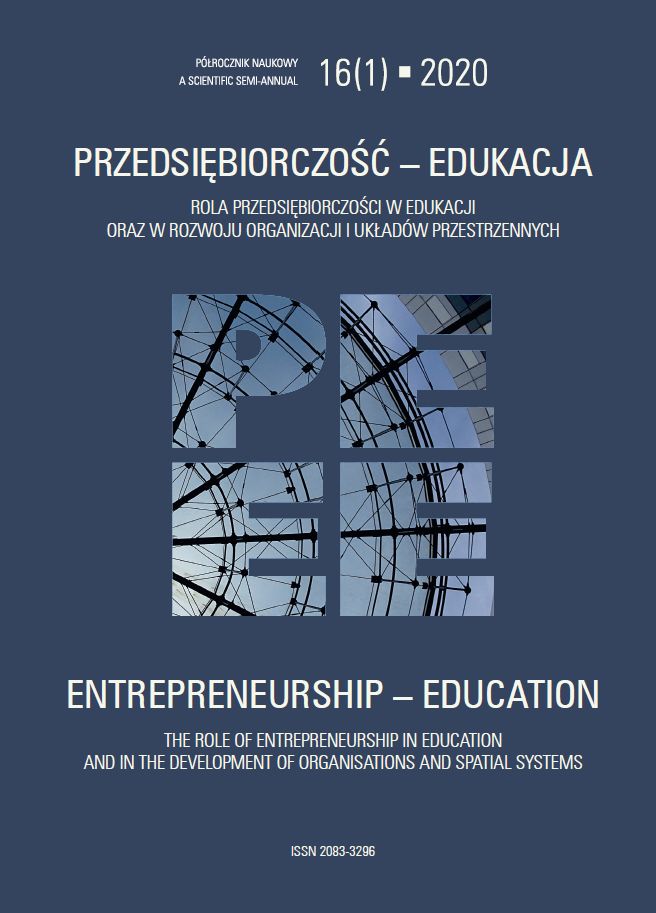Education for Entrepreneurship based on Behavioural Economics: Entrepreneurial Talent and Priming
DOI:
https://doi.org/10.24917/20833296.161.2Keywords:
behavioural economics, education, entrepreneurship, neuroscience, talentAbstract
The article attempts to confront the model of entrepreneurship understood as a talent with selected findings of the dynamically developing neurosciences research. The aim of the article is to indicate the potential of human mind’s biases when thinking fast (automatically) in entrepreneurial education process. The attention is focused on priming, framing and anchoring effects which adequately directed (Thaler’s concept of nudging) may stimulate entrepreneurial ways of thinking and performing. The research method used is thought modelling and analogy based on critical analysis of literature from various areas: entrepreneurship, neurosciences, statistics, and didactics. The perception of entrepreneurship as a talent illustrates the universality of its occurrence (though at a different level), and thus the possibility of its widespread development using tools adapted to time, needs and situation. The behavioural economics on the other hand points out ways of humans’ - as opposed to econs’ - decisions rationalisation through taking advantage of human mind’s biases to construct a choice architecture based on well-matched nudges. The novelty added by the analysis is the integration of research areas in the indication of the essence, importance and usefulness of strengthening mental automatisms of entrepreneurial perception of the situation and environment, as well as the proposition of examples of action tools.
References
Bargh, J.A., Chen, M., Burrows, L. (1996). Automaticity of Social Behavior: Direct Effects of Trait Construct and Stereotype Activation on Action. Journal of Personality and Social Psychology, 71(2), 230–244. Pozyskano z: https://www.psychologytoday.com/files/attachments/5089/barghchenburrows1996.pdf
Berger, J., Meredith, M., Wheeler, S.Ch. (2008). Proceedings of the National Academy of Sciences, 105(26), 8846–8849. Pozyskano z: https://www.researchgate.net
Davidson, R.I., Begley, S. (2013). Życie emocjonalne mózgu. Kraków: Wydawnictwo Uniwersytetu Jagiellońskiego.
Dąbrówka, A., Geller, E., Turczyn, R. (1993). Słownik synonimów. Warszawa: MCR.
Diamond, J. (1996). Trzeci szympans. Warszawa: PIW.
Draganski, B., Gaser, C., Busch, V., Schuierer, G., Bogdahn, U., May, A. (2004). Neuroplasticity: changes in grey matter induced by training. Nature, 427(6972), 311–312.
Eagleman, D. (2012). Mózg incognito. Wojna domowa w twojej głowie. Warszawa: Carta Blanca.
Internetowa encyklopedia PWN, hasło: iloraz inteligencji. (2019, 7 września). Pozyskano z: https://encyklopedia.pwn.pl/haslo/iloraz-inteligencji;3914179.html
Englich, B., Mussweiler, Th., Strack, F. (2006). Playing Dice With Criminal Sentences: The Influence of Irrelevant Anchors on Experts’ Judicial Decision Making. Personality and Social Psychology Bulletin, 32(2), 188–200. Pozyskano z: http://www.eucim-te.eu/data/dppsenglich/File/PDFSStudien/PSPB_32(1).pdf
Eriksson, P.S., Perfilieva, E., Björk-Eriksson, T., Alborn, A.-M., Nordborg, C., Daniel, A. Peterson, D.A., Gage, F.H. (1998). Neurogenesis in the Adult Human Hippocampus. Nature Medicine, 4, 1313–1317.
Gladwell, M. (2010). Poza schematem. Sekrety ludzi sukcesu. Kraków: Znak.
Hornowski, B. (1986). Rozwój inteligencji i uzdolnień specjalnych. Warszawa: Wydawnictwa Szkolne i Pedagogiczne.
Jamka, B. (2014). Wzrost innowacyjności organizacji poprzez rozwój przedsiębiorczości jako talentu. W: E. Skrzypek (red.), Wpływ wiedzy na sukces organizacji w nowej gospodarce. Lublin: UMCS, 79–92.
Kahneman, D. (2012). Pułapki myślenia. O myśleniu szybkim i wolnym. Poznań: Media Rodzina.
Maguire, E.A., Gadian, D.G., Johnsrude, I.S., Good, C.D., Ashburner, J., Frackowiak, R.S. J. i Frith, C.D. (2000). Navigation-related structural change in the hippocampi of taxi drivers. Proceedings of the National Academy of Sciences, 97(8), 1398–1403.
Nisbett, R.E. (2015). Geografia myślenia. Dlaczego ludzie Wschodu i Zachodu myślą inaczej?. Sopot: Smak Słowa.
Naukowiec.org. (2019, 19 kwietnia). https://www.naukowiec.org/wiedza/statystyka/rozklad-normalny-rozklad-gaussa_710.html
Shook, C.L., Priem, R.L., McGee, J.E. (2003). Venture Creation and the Enterprising Individual: a Review and Synthesis. Journal of Management, 29(3), 379–399.
Strelau, J. (1997). Inteligencja człowieka. Warszawa: Wydawnictwo Akademickie Żak.
Surma J. (2010). Rola analogii w podejmowaniu decyzji w zarządzaniu strategicznym małymi i średnimi przedsiębiorstwami. Warszawa: Oficyna Wydawnicza Szkoła Główna Handlowa w Warszawie.
Tannenbaum, A.J. (1984). Gifted children: Psychological and educational perspectives. New York: MacMillan.
Thaler, R.H., Sunstein C.R. (2017). Impuls. Jak podejmować właściwe decyzje dotyczące zdrowia, dobrobytu i szczęścia. Poznań: Zysk i S-ka.
Walker, T.D. (2017). Fińskie dzieci uczą się najlepiej. Co możemy zrobić, by nasze dzieci były szczęśliwsze, wierzyły w siebie i lubiły szkołę? Kraków: Wydawnictwo Literackie.
Wissema, J.G. (2005). Technostarterzy – dlaczego i jak?. Warszawa: PARP.
Downloads
Published
How to Cite
Issue
Section
License
Articles are published under the terms of the Creative Commons License (CC BY-ND 4.0; Attribution– NoDerivs).

